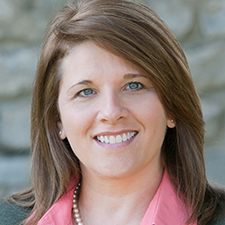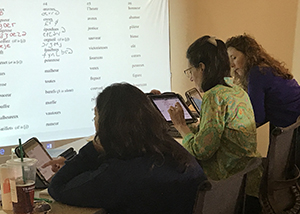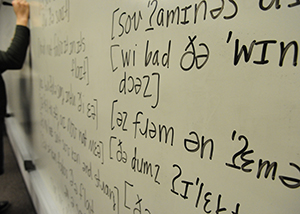What's New > NATS Summer Workshop features diction guru Cheri Montgomery
 |
Cheri Montgomery
|
Cheri Montgomery is one of the featured presenters at the NATS 2019 Summer Workshop, sponsored by the RCM Certificate Program. We’ve asked Cheri to talk about some of the key takeaways from her sessions. You are sure to gain new skills and perspectives by taking part in this unique event.
Read more about Cheri Montgomery
and the other workshop presenters.
CLICK HERE FOR REGISTRATION.
Can you fill people in on some of the key takeaways from your presentations?
The session “So You’ve Been Asked to Teach Diction...” is designed to empower the lyric diction instructor. Attendees will discover that their knowledge, as vocal professionals, uniquely qualifies them to teach diction.
The presentation begins with a brief history of the course. Offering diction in the music department is a recent innovation. Exposure to diction was formerly gained through grammar study. For the novice, it might seem plausible that diction should be taught by native speakers in the language department. The instructor need not be intimidated by this mind-set. There is no such thing as an ideal diction instructor. The most effective candidate would be many people in one: a coach, a singer, an accompanist, a vocal pedagogue, and a native of Italy, Germany, France, and England. This person does not exist! There is, however, an ideal approach. Understanding the differences between the spoken and sung forms of diction and organizing the course according to the skill sets involved insure a successful study of lyric diction.
 Preparing a lyric diction course involves customization. The selection of languages and the hours given to teach each language impact the structure of the course. This session offers a wide variety of approaches to help instructors organize a lyric diction study that fulfills departmental needs.
Preparing a lyric diction course involves customization. The selection of languages and the hours given to teach each language impact the structure of the course. This session offers a wide variety of approaches to help instructors organize a lyric diction study that fulfills departmental needs.
My other presentation “Incorporating Diction Studies into the Private Studio” was specifically designed for the independent studio teacher. It also benefits university teachers who work with voice minors, elective voice students, music theater majors, pre-college students, adult students, and voice students in programs with limited diction requirements. The session will demonstrate how articulatory phonetics and function of the voice are intricately connected. Valuable organizational tips will be provided to help voice teachers incorporate the equivalent of a lyric diction course into the student’s weekly lesson and assignment schedule.
 If I’m already a lyric diction teacher, what sort of new perspectives will I gain, so that I could say I was really glad I took part in the workshop.
If I’m already a lyric diction teacher, what sort of new perspectives will I gain, so that I could say I was really glad I took part in the workshop.
The voice is a phonetic instrument. The sounds of languages help singers explore the function of the voice. Studio teachers will be given tips on how to incorporate articulatory phonetics into their private lessons. Likewise, diction instructors will learn how to incorporate singing into the lesson plan and how this activity enhances the value of the course. A lyric diction course breaks down the complexities of language and focuses on the basic elements of vocal sounds. Vowels and consonants are the tools. The lyric diction classroom provides an ideal nurturing ground for vocal discovery.
Are there any fond recollections that led you to become a specialist in the field of teaching diction?
I’ve wanted to be a voice and diction teacher since I was a child. My father, Archie Kliewer, was an Assistant Professor of Voice at Belmont University and Southern Seminary. I visited his voice lessons and classes on numerous occasions throughout my childhood. His joy for teaching was contagious. His passion for topics in voice and diction sparked my interest. My mother spoke Hochdeutsch. I loved hearing the sound of her voice as she conversed and read in German. My family sang German hymns in church. These experiences inspired my love for the sounds of languages and singing.
My father was a Regional Governor of NATS. His enthusiasm for languages and singer’s diction led him to introduce the concept of a diction course for singers at a local NATS meeting. Back then, it was a hot-button topic. My dad was ahead of his time!
Would any of the subject matter relate to teaching CCM?
Dialect is imperceptible in fine singing. The study of lyric diction helps singers of all styles discover a pronunciation that is optimal for singing.
How would the subject matter relate to those who teach in an independent studio?
Singing is a multi-disciplinary art form. Incorporating diction study into the private lesson time provides an activity that is not vocally demanding, encourages vocal exploration, and prepares the student for advanced literature. Adding diction creates a financial incentive to offer higher quality instruction and longer lessons.
 Are there other thoughts you’d like to add about the workshop?
Are there other thoughts you’d like to add about the workshop?
This workshop is ideal for coaches and singers hoping to secure their first university job. It is a wise career move to specialize in lyric diction. Schools with vocal performance degree programs are required to provide a lyric diction sequence (according to NASM accreditation standards). Singers and coaches who have strategically planned to teach lyric diction are needed.
The workshop is also ideal for independent voice teachers who wish to prepare their students for competitions and college auditions. Voice students with an understanding of lyric diction perform with authority, succeed in competition, and are more likely to get accepted into the program of their choice. Knowledge of articulatory phonetics improves the quality of the lesson and enhances the student’s awareness of the voice.
This workshop is designed to:
• inspire young singers and coaches to specialize in lyric diction
• train the private voice teacher to incorporate diction study into the lesson time
• give university voice professors the information they need to organize a lyric diction course
• prepare diction teachers to offer advanced courses that include Scandinavian and Russian diction
• prepare young artists to sing with ease and accuracy in multiple languages
• equip coaches with resources that will enable them to assist singers with confidence
• enhance the quality of teaching in the lyric diction classroom
Workshop Photos (from top): Cheri Montgomery testing students' pronunciation of German; Voice and diction teachers annotate from iPads in a diction workshop offered by Cheri Montgomery; Transcriptions of English art songs in Cheri Montgomery's workshop.
CLICK HERE for more about the 2019 NATS Summer Workshop, sponsored by the Royal Conservatory of Music (RCM) Certificate Program.

